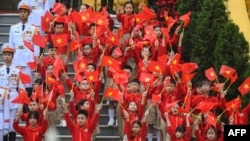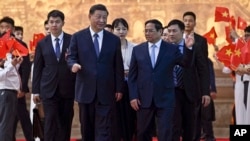Anti-China protests have been a cornerstone of Vietnamese activism, but the response to Chinese President Xi Jinping's December 12-13 visit to Vietnam has been muted as Hanoi has jailed critics, and activists and experts cite an atmosphere of fear among those still free.
During last week’s visit, Vietnam agreed to join Beijing’s “community with a shared future,” described by China’s state news agency Xinhua as a step up from the previous “comprehensive strategic partnership.” The countries signed 36 agreements centered on increased cooperation, including security and joint efforts for the development of railways and telecommunications.
People speaking with VOA during and after the visit expressed frustration over Hanoi moving closer to Beijing and Chinese incursion into Vietnamese waters.
"Previously, each visit to Vietnam by Mr. Xi Jinping was met with backlash from the people. In 2015, hundreds of Vietnamese people took to the streets to protest against the Chinese president," Tran Anh Quan, a Ho Chi Minh City-based social activist, told VOA.
"Almost everyone who regularly takes to the streets to oppose Xi Jinping and the cow tongue line has been arrested," he wrote in Vietnamese, using the slang term for China's nine-dash map line that Beijing uses to assert its claim to almost all of the South China Sea.
There are currently 178 jailed activists in Vietnam, according to the Chicago-based nonprofit The 88 Project, which supports human rights in Vietnam. Pham Doan Trang, one of the country's most influential activists, was sentenced to nine years in jail in December 2021 for spreading "anti-state propaganda."
Susann Pham, a political sociology lecturer at Turkey's Bilkent University and author of a book on Vietnam's dissidents, described the current environment similarly.
"The few that are not in prison yet … every day they are harassed, they are watched," Pham said.
Preventing protest
Although leading activists are incarcerated, officials still took action to block potential public outcry, and meted out "very harsh sentences" to government critics in the days surrounding Xi's trip to "deter political dissidents," Quan said. He pointed to the cases of Phan Thi Nha and Nguyen Hoang Nam, both of whom were accused of sharing information online that criticized the Communist Party. Nha was sentenced to six years in prison on December 12 and Nam was given eight years of jail time on December 11.
Activists were also prevented from leaving their homes and police patrolled public meeting places, according to Quan.
"To prevent people from taking to the streets to protest against Xi Jinping, Vietnamese security also guarded the homes of dissidents and guarded places where there are frequent protests such as Ly Thai To flower garden in Hanoi [and] Notre Dame Cathedral in Saigon," he said.
Hanoi is known for guarding activists' homes.
"It's a common strategy to block or just watch the activists' gates or houses a few days before a visit," Pham said, adding, "It's intimidating."
Nguyen Ngoc Nhu Quynh, a Vietnamese activist known by her pen name Me Nam, or Mother Mushroom, experienced this. During Xi's 2015 visit, she wanted to go from her then-home in the coastal city of Nha Trang to Ho Chi Minh City to protest. The night before the demonstration, plainclothes officers came to her home and stayed until the end of the next day.
"They just came to my house and announced that I didn't have the right to leave," Quynh told VOA from Texas, where she now lives after having been granted U.S. asylum in 2018.
Grievances
On December 13, the countries agreed to ramp up cooperation and Hanoi joined Beijing's “community with a shared future." Beijing holds similar ties with other nations, but the wording was changed from “common destiny” for Vietnam, said Nguyen Khac Giang, visiting fellow at the ISEAS-Yusof Ishak Institute.
"The change from 'common destiny' to 'shared future' is to make it less sensitive to the Vietnamese audience who are still quite suspicious of the Chinese overture of Vietnam," Giang said, speaking from Hanoi, where the streets were crowded from the increased security during Xi's visit.
Some are unconvinced by the altered wording.
"They knew that [using] 'common destiny' would really depress the Vietnamese people so they tried to twist the words," Quynh said.
For Quan, China's aggression in Vietnamese waters is a top concern. By international law, Vietnam's territory extends 200 nautical miles off its coastline, but the presence of Chinese vessels, the harassment of fishermen, and the patrolling of oil fields is well documented.
"These actions show that China does not sincerely [want to] build a cooperative relationship with Vietnam but actually just wants to invade and colonize its neighbor," Quan said.
Giang added that Hanoi has likely increased online censorship in the days surrounding Xi's visit. "I think this topic would be heavily managed online," he said.
It is not only Vietnamese activists who are concerned. Ray Powell, director of Stanford University's Gordian Knot Center which monitors the South China Sea, noted the odd movement of a Chinese research vessel this May which appears to have sketched out the character “zhong,” which means China in Mandarin.
"The survey continued down into Vietnam's EEZ [exclusive economic zone] and it started just driving in this weird pattern," Powell said, referring to the country's exclusive economic zone. "[It] created the character that means ‘China’ in Vietnam's EEZ."
"It's very obvious," he said of the satellite footage of the vessel's path. "It is really kind of astonishing."
Thang Nguyen, who left Vietnam in 1978 as a refugee, said the tight-knit relationship between Hanoi and Beijing is hard for many to accept.
"The encroachment into Vietnamese territory … we remember those things and we still witness that, so we don't trust the sincerity of China in dealing with Vietnam," said Nguyen, now the CEO of Virginia-based Boat People SOS which advocates for human rights in Vietnam. "They are always trying to grab more land and territory of Vietnam and to dominate Vietnam."
Anti-China sentiment is common, a Ho Chi Minh City native told VOA.
"When I told Vietnamese that I'm learning Chinese, a few [people said] to me why are you studying Chinese, I hate them," she told VOA, without giving her name.
"Lots of people hate them from our history," she said.






